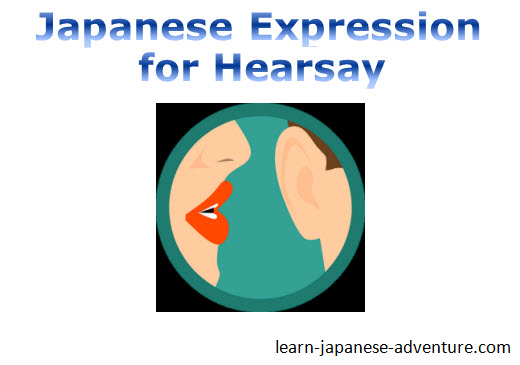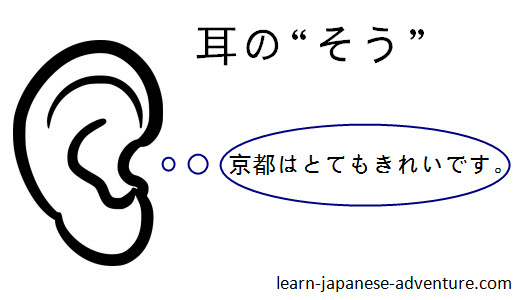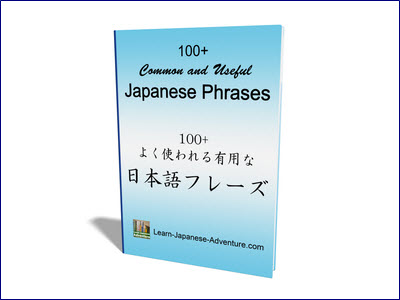- Home
- Intermediate Lessons
- Japanese Expression for Hearsay
Japanese Expression for Hearsay -
Intermediate Lessons: 10
The Japanese expression そうです (sou desu) that you will be learning in this lesson is used to convey the message that you obtained from another information source, either you have heard from someone or you have read it somewhere.

Sentence Pattern
The sentence pattern for this grammar is quite simple...
~Plain-form そうです
~Plain-form sou desu
Meaning: I heard that ~.
Note: Plain-form means the word before "sou desu" can be verb, i-adjective, na-adjective or noun, all in plain-form.
In this Japanese expression, take note that your own opinion is not included in the information that you are conveying.
Let's use an example to show how this expression works using the following situation. In the office...
- 田中さんは言います。「京都はとてもきれいです。」
tanaka san wa iimasu. "kyouto wa totemo kirei desu."
Meaning: Ms Tanaka says: "Kyoto is very beautiful."
Suppose that you heard what Ms Tanaka has just said. Later on, Ms Tanaka left the office. A while later Mr Suzuki comes to your desk and you tell him the following...
- 田中さんは京都はとてもきれいだと言っていました。
tanaka san wa kyouto wa totemo kirei da to itte imashita
Meaning: Ms Tanaka said that Kyoto is very beautiful.
~と言っていました (~to itte imashita) is using the quotation that you have learned in lesson 27 of the basic lesson, except that in this situation, the speaker who you are quoting from is absent and you are quoting what she has said in the past.
You can also convey the same message by using the Japanese expression そうです (sou desu)...
- 京都はとてもきれいだそうです。
kyouto wa totemo kirei da sou desu
Meaning: I heard that Kyoto is very beautiful.
However in this situation Mr Suzuki doesn't know where is the source of this information.
If you want to give Mr Suzuki on the information source, you can say this...
- 田中さんによると京都はとてもきれいだそうです。
tanaka san ni yoru to kyouto wa totemo kirei da sou desu
Meaning: According to Ms Tanaka, Kyoto is very beautiful.
そうです (sou desu) with Information Source
So you can change the above sentence pattern into the following...
Information source によると ~Plain-form そうです
Information source ni yoru to ~Plain-form sou desu
Meaning: According to Information source, I heard that ~.
The difference between ~と言っていました (~to itte imashita) and そうです (sou desu) is that the former is used to quote what another people had said.
Whereas the latter is mostly used when the information source is unclear and you are just stating what you have heard or read.
You are also not sure whether what you have heard or read is true or not.
More Examples
|
1. |
Source: 天気予報, Information: 明日は雨が降ります |
|
2. |
Source: 雑誌, Information: スペインの夏は暑いです |
|
3. |
Source: 鈴木さん, Information: 山田さんは昨日元気ではありませんでした |
|
4. |
Source: ニュース, Information: 2012年にロンドンでオリンピックがあります |
|
5. |
Source: 新聞, Information: 来年日本で大きい地震があるでしょう |
Some Examples Without the Information Source
|
1. |
Information: マイクさんは子供の時、アメリカに住んでいました |
|
2. |
Information: チンさんは明日北海道へ行きます |

Sometimes, the Japanese expression そうです (sou desu) you have learned in this lesson is called 耳の"そう" (mimi no "sou") since the information is something you have heard or read from another source.
I will introduce another expression 目の"そう" (me no "sou") in future lesson which is used when you are guessing from something you have seen.
Monster Sale! Get 40% OFF forever on Premium & Premium PLUS plans! Ends on 24 Oct 2025
The link above is an affiliate link, which means that I would earn a commission (at no extra cost to you) if you do end up purchasing the related learning course.
Buy me a coffee








Facebook Comments
Don’t see the comments box? Log in to your Facebook account, give Facebook consent, then return to this page and refresh it.